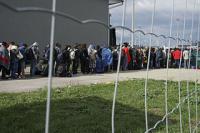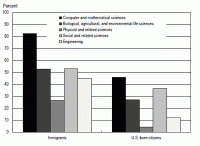-
New regulations improve opportunities for certain highly skilled workers

DHS’ U.S. Citizenship and Immigration Services on Friday announced changes to the programs serving the H-1B1, E-3, and CW-1 nonimmigrant classifications, and the EB-1 immigrant classification. The purpose of the changes was to remove the obstacles and disadvantages workers in these categories faced compared to workers in other visa classifications.
-
-
Wave of refugees a major boost to German economy, society: Economists

A leading German economist says that Germany stands to gain from the wave of migrants arriving in the country. The long-term economic gains from the large number of refugees arriving in Germany, he said, will far outweigh the considerable immediate costs Germany faces. Germany is facing an imminent demographic crisis, which would see the country’s working population shrink by around 4.5 million over the next decade unless a sufficient number of immigrants is allowed to come and work. This promises great opportunities for new arrivals to be integrated into the workplace. “In the long run the refugees are an incredible opportunity for Germany,” says Marcel Fratzscher, the head of the German Institute for Economic Research (DIW).
-
-
Tackling the under-representation of British Muslims in top professions
A new report finds that British Muslims are least likely to hold professional or managerial jobs of any religious group in Britain — at only half the average level (16 to 30 percent) — and that more likely to be unemployed or living in poverty. The report calls for urgent action from government, employers, universities, and within the Muslim community to encourage economic participation and prevent conscious or unconscious discrimination.
-
-
Immigrants account for a larger share of U.S. science and engineering workforce

From 2003 to 2013, the number of scientists and engineers residing in the United States rose from 21.6 million to 29 million. An important factor in that increase: over the same time period, the number of immigrant scientists and engineers went from 3.4 million to 5.2 million. Immigrants went from making up 16 percent of the science and engineering workforce to 18 percent, according to a new report.
-
-
Immigrants come to resemble native-born Americans over time, but integration not always smooth
As immigrants and their descendants become integrated into U.S. society, many aspects of their lives improve, including measurable outcomes such as educational attainment, occupational distribution, income, and language ability, but their well-being declines in the areas of health, crime, and family patterns, says a new report from the National Academies of Sciences. At the same time, several factors impede immigrants’ integration into society, such as their legal status, racial disparities in socio-economic outcomes, and low naturalization rates.
-
-
U.K. foreign-born population exceeds 8 million
This Thursday, the U.K. Office for National Statistics (ONS) will publish a new set of migration statistics. The data will cover many different topics, but two numbers are likely to attract attention: one relating to the “flow” of migrants in and out of the United Kingdom, the other relating to the “stock” of foreign-born people living in the United Kingdom. In the last quarter’s data, net migration was estimated to stand at 318,000 — just 2,000 below the highest level previous recorded in 2005. The U.K.’s foreign-born population is expected to exceed eight million for the first time in the published ONS data. Experts say that the more fundamental questions about migration policy successes and failures are more nuanced than a set of figures, and these questions include how immigration affects the U.K. labor market and whether it makes existing U.K. residents wealthier.
-
-
EB-5 foreign investor visa program susceptible to fraud, misuse: GAO
The United States has launched dozens of investigations into fraudulent practices in a program, called EB-5, which grants Green Cards to foreigners who invest $500,000 in selected U.S. ventures. A GAO report notes that the program is vulnerable to fraud, because many of the applicants care less about the success of the venture in which they invest and more about getting the Green Card, and can easily afford to lose $500,000 in order to get the card.
-
-
U.K. needs more “constructive” thinking on migrant welfare benefits
As the British political debate continues on whether the British government should try to impose a four-year ban on EU migrant citizens claiming in-work benefits, a new Oxford University study argues that rather than pursuing treaty change, more constructive thinking could ease the financial burden on British taxpayers. The study author says one solution could be to set up an EU fund for helping local authorities most affected by immigration. He also highlights the relatively lax access to NHS services that EU citizens enjoy in Britain compared with other EU member states.
-
-
DHS asks judge to cancel contempt hearing over immigration executive order
When President Barack Obama last year issued his Deferred Action for Childhood Arrivals (DACA) executive order, applicants covered by the order received a three-year work permit, or EADs (Employment Authorization Documents). On 16 February 2015, Brownsville, Texas-based U.S. District Judge Andrew Hanen temporarily blocked Obama’s immigration action. After the temporary injunction was in place, the federal government mistakenly issued the approximately 2,500 three-year permits. On Friday, DHS secretary Jeh Johnson asked Judge Hanen not to find him and other Obama administration officials in contempt, telling the judge that DHS had recovered all but 22 of the 2,500 offending permits. Johnson also advised the judge that DHS had corrected federal computer databases to invalidate those permits not turned over by their owners.
-
-
DHS selects U Houston as Center of Excellence for Borders, Trade and Immigration Research
The U.S. Department of Homeland Security (DHS) Science and Technology Directorate (S&T) yesterday announced the selection of the University of Houston as the lead institution for a new DHS Center of Excellence (COE) for Borders, Trade and Immigration Research. S&T will provide the Center for Borders, Trade and Immigration Research with an initial $3.4 million grant for its first operating year.
-
-
Companies gaming the system to get their H-1B visa applicants approved
Many foreign applicants for the 65,000 yearly available H-1B U.S. work visas, which allow U.S. companies temporarily to employ foreign workers in specialty positions, are finding that their paperwork is not even being considered due to the fact that many companies are using various behind-the-scenes schemes better to control their own employment interests, disrupting the system while also highlighting the inefficiency of the current registration process.
-
-
Improving the legal status of undocumented immigrants beneficial to U.S.: Expert
In 2012 the administration announced two executive orders — the Deferred Action for Childhood Arrivals (DACA) and the Deferred Action for Parental Accountability (DAPA) — aiming to facilitate the legalization of status of certain groups of undocumented immigrants. An immigration scholar believes that if Obama’s proposed expansion of DACA and the creation of DAPA survive current legal challenges, they could form the foundation for permanent immigration reform. She also says that decades of research show that easing consequences for people in the United States illegally will not encourage more people to come here illegally. Contrary to public opinion, welfare levels and benefits in the United States do not affect migration flows, which are more influenced by economic conditions in the United States and the migrants’ home countries.
-
-
U.K. high-tech industry wants more skilled immigrants to be allowed into Britain
The British tech industry is pushing for immigration reform that will help startups reach up to 500 million European Union customers and allow U.K. firms to attract a global talent pool. The tech industry is worth £100 billion to the U.K. economy, but companies are increasingly unable to find sufficient talent to fill vacancies.To help tackle the skills gap, British officials are investing in STEM education with the introduction of a new computing curriculum to schools and a pledge to train 17,500 math and physics teachers in the next five years, but industry insidersstress that immigration must be addressed if the U.K. tech and start-up scene is ever going to develop a firm the size of Google or Facebook.
-
-
Spanish “kebab laws” worry, upset Muslim immigrants
Withy persistent unemployment and worries about radicalization, more Spanish cities are placing limits on businesses typically owned and operated by immigrants from North Africa. In the city of Terragona, for examples, these regulations – informally called “kebab laws” — disallow commercial licenses to any kebab shops, dollar stores, or Internet cafes within 500 yards of existing ones. Additionally, these businesses would have to comply with stricter hygiene standards and business hours. Muslim leaders in Spain and civil rights advocates say these laws are a thinly veiled effort to discourage Muslim immigration.
-
-
Tech companies push for more visas for highly skilled foreign workers
Tech companies seeking more visas for highly skilled foreign workers are pushing their agenda as the United States grant visas to a number of immigrants in a lottery which began this week. Supporters of the campaign say 233,000 people are vying for 85,000 H-1B temporary visas. Some critics want to cut back on the H-1B visas, blaming the program for displacing American workers, butcalls to scale back on H-1B visas will have to overcome a campaign backed by powerful groups. In 1999, Congress raised the cap to 115,000 to help the booming technology sector. That limit soon rose to 195,000 before falling back to its current level in 2004.
-
- All
- Regional
- Water
- Biometrics
- Borders/Immig
- Business
- Cybersecurity
- Detection
- Disasters
- Government
- Infrastructure
- International
- Public health
- Public Safety
- Communication interoperabillity
- Emergency services
- Emergency medical services
- Fire
- First response
- IEDs
- Law Enforcement
- Law Enforcement Technology
- Military technology
- Nonlethal weapons
- Nuclear weapons
- Personal protection equipment
- Police
- Notification /alert systems
- Situational awareness
- Weapons systems
- Sci-Tech
- Sector Reports
- Surveillance
- Transportation
Advertising & Marketing: advertise@newswirepubs.com
Editorial: editor@newswirepubs.com
General: info@newswirepubs.com
2010-2011 © News Wire Publications, LLC News Wire Publications, LLC
220 Old Country Road | Suite 200 | Mineola | New York | 11501
Permissions and Policies
Editorial: editor@newswirepubs.com
General: info@newswirepubs.com
2010-2011 © News Wire Publications, LLC News Wire Publications, LLC
220 Old Country Road | Suite 200 | Mineola | New York | 11501
Permissions and Policies
